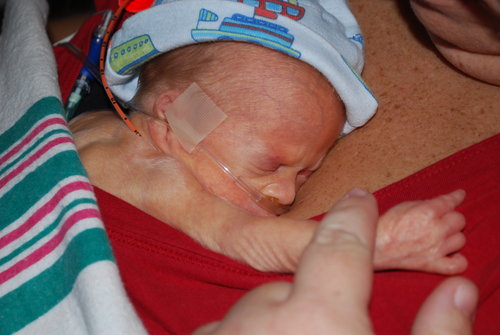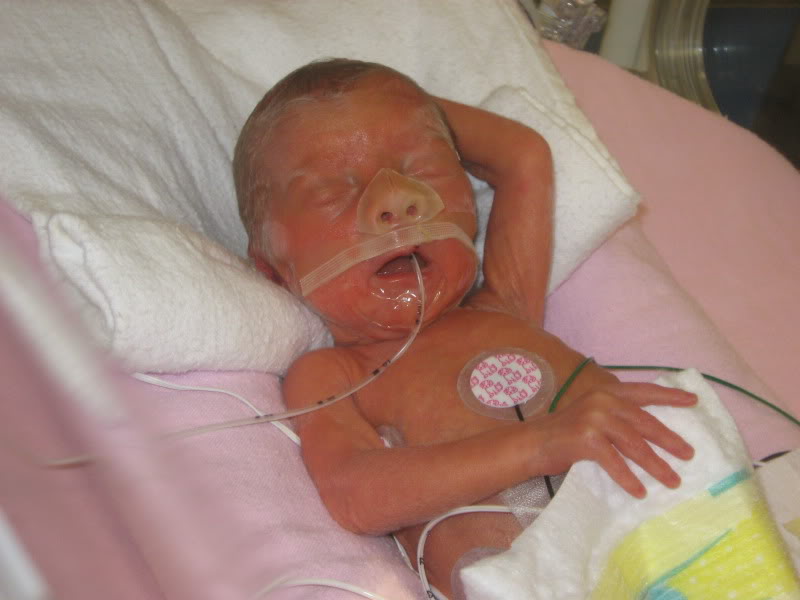It is noted that about eight percent of the births in the UK are premature. If a woman is healthy, she is more than likely to carry the baby full term, which means around 37 to 42 weeks. Only about two percent of women go into early labour, which results in premature births.
The word "term" is used to define a birth that takes a full 37 weeks of pregnancy. If the baby arrives before these 37 weeks, it is termed as "premature" or early born. There isn’t any one reason why babies are born at 27 weeks and this usually happens in cases where there are twins or more than one baby inside a mother’s womb.
A baby born at 27 weeks is weak and fragile and may cause distress to parents who might feel sad, unsure, confused or frightened.
What Is the Condition of a Baby Born at 27 Weeks?
- Premature babies are born weak with less weight. Most premature babies weigh around 2 to 3 pounds.
- Premature births give rise to various complications in infants, as these babies are too weak and small to swallow, suck or breathe properly and require intensive care in the form of oxygen and surfactants to help them breathe properly.
- They have to be fed through a vein and be kept in an incubator to protect them from germs.
- In addition, premature babies have less muscle tone and cannot move a lot, so they sleep most of the day.
- Since premature babies did not have enough time to fully develop, they have thin reddish skins and their veins are visible underneath.
- They have little or no hair and almost no eyelashes. They haven't put on fat so they appear to be puny and fragile. Their bodies are covered with soft hair, which is normally known as "lanugo".


Possible Risks
Premature babies are at a great risk for medical complications as their immune system isn’t strong enough yet. Most babies born at 26 to 27 weeks survive up to a year, sometimes more, depending on the care they receive. Statistics tell that 90 percent of the babies born at 27 weeks grow up to lead normal healthy lives. 25 percent of premature babies develop serious medical conditions and may experience disabilities later on in life.
You may take a look at other babies who are born at 27 weeks and how they are doing right now: http://www.lilaussieprems.com.au/inspirational-premature-baby-photos-born-at-27-weeks/
What Special Care Does a Baby Born at 27 Weeks Need?
New born babies, especially those that are premature, are not fully equipped to deal with life immediately after being born. Their bodies are weak and their lungs, skin, immune and digestive systems are still underdeveloped. The latest medical equipment and techniques have, however, have made it possible for premature babies to survive.
NICU
NICU, which stands for Neonatal Intensive Care Unit, is a special area of the hospital where babies are admitted. This unit has advanced technology and trained, specialized doctors who are fully equipped to take care of tiny infants born prematurely. NICU may house areas or units where continuing care is provided to not only babies that are premature, but also babies that require extra care and nursing. When hospitals do not have a NICU, babies are transferred to a hospital that does have it.
Respiratory Assistance
A babyborn at 27 weeks is not fully developed yet and needs help with breathing. His/her lung is not yet fully developed and thus your baby is not ready to breathe surrounding air on his own.
Giving the baby extra help in breathing is known as ventilation. There are many types of gentle breathing support available for the new-borns as artificial breathing machines can sometimes cause lung problems as well.
- Endotracheal tube: This is a medical procedure in which a tube is placed into the trachea, commonly known as the windpipe through the mouth or nose of the babies.
- Ventilator: It’s a special machine designed for those patients that are unable to breathe on their own.
- Continuous positive airway pressure: Methods where prongs or masks are placed under the baby’s nose to help keep the lungs dilated and open.
- Oxygen hood: A pair of prongs is placed under the baby’s nose so that sufficient oxygen levels are maintained in the blood stream.
Methods of Feeding
- Intravenous lines: Premature babies may be fed with an IV placed in their tiny hands, feet or scalp, where veins are prominent and easily accessed. This IV tube connects to a bag that contains special fluids.
- Umbilical catheter: After the babies are born, their umbilical cord is cut but short stumps of it remain. These umbilical cords can be used for insertion of tubes that deliver medications, fluids and blood to the babies. The insertion tubes are known as catheters.
- Oral and nasal feeding: Taking feed from the breasts requires strength, which most premature babies don’t have. Thus, premature babies are fed through a tube, which goes into their mouth or nose. This method ensures that babies get all of their nutrition directly in their stomach.
- Central line: This method requires an intravenous line that is inserted into the babies' arms and makes use of larger veins. Smaller veins might get easily ruptured and thus feeding the baby through larger veins ensures that proper nutritional needs of the infant are being met.
Taking Care of Your Baby Born at 27 Weeks
Premature babies need special care after they are born. Most hospitals that do not have NICU units transfer babies to special units or hospitals so that they are given proper nursing care. When the premature baby arrives, ask the doctor various questions about how the baby will be kept and fed in the NICU. The more you understand the condition, the better you'll be able to handle it.
- Talking to premature babies and holding them close creates a bond with them. Do that often, and be comfortable enough to carry your tiny infant with the tubes and monitors attached to the baby to give him/her oxygen or nutrition.
- Take a course in CPR before leaving the hospital as premature babies have trouble breathing and knowing this would prove very helpful in case of emergency.
- Breastfeed your baby as breast milk contains special proteins that help new-born babies fight infections and diseases. However, these babies are too small and weak to suck, so they are often fed through a tube. Breast milk can be pumped and given to infants through other methods.
- Avoid putting premature babies into car seats as it increases the risk of breathing problems. Car seats should only be used once the doctor gives the approval. In addition, baby born at 27 weeks or any premature babies should not be kept in tight blankets or backpacks, as this might hinder their breathing.
- Take special note of the changing conditions of the baby and contact doctors immediately if the baby’s medical condition alters. It is also important to schedule follow up visits regularly to make sure that you baby is perfectly well.
